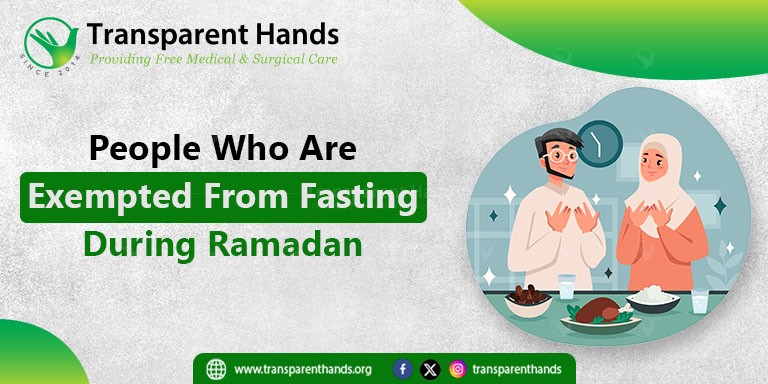People Who Are Exempted From Fasting During Ramadan

Ramadan is the ninth month of the Islamic calendar and is widely acknowledged to be the holiest. A survey conducted by the PEW Research Center reveals that 93% of Muslims fast during Ramadan. Fasting during Ramadan is obligatory for adult Muslims and is considered the third pillar of Islam.
The Quran ordains: “O you who have believed, decreed upon you is fasting as it was decreed upon those before you that you may become righteous” (Surat Al-Baqarah, 2:183)
Fasting is an obligation for Muslims, and it brings great rewards. However, Allah (SWT) does not burden people beyond their capacity. Thus, some people are exempted from fasting during Ramadan under certain conditions. In case of improvement in (some of these) conditions, the person is expected to make up for the fasts they missed after Ramadan. In other cases, the person might have to pay Fidya or Kaffarah. Let’s explore these categories in this article.
What is Fasting in Islam?
Muslims abstain from eating, drinking, and immoral acts from fajr to Maghrib while they fast. They curb their physical desires and try to attain spiritual purity by developing a strong connection with Allah (SWT). Fasting is an act of devotion to Allah (SWT) alone and will only be rewarded by Allah (SWT). According to a Hadith:
The Prophet (ﷺ) said, “Indeed your Lord said: ‘Every good deed is rewarded with ten of the same up to seven hundred times over. Fasting is for Me, and I shall reward for it.’ Fasting is a shield from the Fire. The smell coming from the mouth of the one fasting is more pleasant to Allah than the scent of musk. If one of you is abused by an ignorant person while fasting, then let him say: ‘Indeed I am fasting.'” (Jami` at-Tirmidhi 764)
Pay Your Zakat Online
People with physical & mental illnesses:
People suffering from chronic or temporary illnesses who may find fasting difficult are exempted from fasting during Ramadan. The same applies to people whose recovery from a physical condition can be hampered by fasting. Similarly, people with mental illness don’t have to fast.
Fragile Health:
It is permissible to skip fasts if your health doesn’t allow you to do so. Similarly, children who have not reached puberty are not required to fast.
Traveling:
It is permissible for travelers to avoid fasting under certain circumstances. However, the purpose of the travel should not be sinful, and the intention should not be to settle at the destination for less than fifteen days. Moreover, one must go beyond the original place of departure limits to qualify for this exemption.
People experiencing extreme thirst or hunger:
If one believes that continuing to be thirsty or hungry can cause physical harm, breaking a fast before the designated time (sunset) is permissible.
10 Health Benefits of Fasting in Ramadan
Coercion:
If someone is in a position where they are threatened and asked to break the fast, they are allowed to do so.
Women during mensuration:
Women undergoing their periodic mensuration cycles are also exempted from fasting during Ramadan. They can continue fasting after the cycle is completed and after performing ablution (ghusl).
During Pregnancy or breastfeeding:
Women who are either pregnant or breastfeeding their children are allowed to break their fast if their or their children’s health is at risk.
The Significance of 1st, 2nd, and 3rd Ashra of Ramadan
Evidence from the Quran:
The Quran sets the rules clearly in the following verses of Surah Al-Baqarah:
“The month of Ramadhan [is that] in which was revealed the Qur’an, a guidance for the people and clear proofs of guidance and criterion. So whoever sights [the new moon of] the month, let him fast it; and whoever is ill or on a journey – then an equal number of other days. Allah intends for you ease and does not intend for you hardship and [wants] for you to complete the period and to glorify Allah for that [to] which He has guided you; and perhaps you will be grateful. (Al-Baqarah, 2: 185)”
Conclusion
During Ramadan, Muslims strive to strengthen their relationship with Allah (SWT) by fasting and following the righteous path. Ramadan is a great opportunity for reflection, spiritual growth, and self-discipline. Fasting is a great way of achieving those objectives. While most Muslims relish this opportunity to strengthen their relationship with Allah (SWT), a few exemptions are provided to those unable to fast. People who are too young or old, travelers, physically and mentally challenged people, and women going through menstrual cycles are exempted from fasting during Ramdan. This is in line with the compassionate teachings of Islam, emphasizing that Allah (SWT) doesn’t want us to experience undue hardships.
While we experience the blessings of Ramadan, we should express our gratitude to Allah (SWT) for allowing us the opportunity for devotion. While we thank Him for His numerous blessings, we should also help the less fortunate.
Transparent Hands offers free medical and surgical services to Pakistan’s most deserving patients. We organize free medical camps and surgeries while ensuring transparency in our operations. We also offer a secure and convenient way to give Zakat, Sadaqah, and Fidya. Our online crowdfunding platform ensures you know who you’re helping and how your contributions impact lives. Donate now to impact lives during the holiest time of the year.











Leave Your Comments